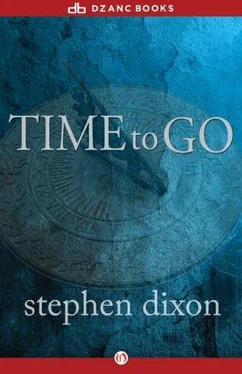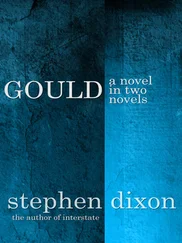Stephen Dixon - Time to Go
Здесь есть возможность читать онлайн «Stephen Dixon - Time to Go» весь текст электронной книги совершенно бесплатно (целиком полную версию без сокращений). В некоторых случаях можно слушать аудио, скачать через торрент в формате fb2 и присутствует краткое содержание. Год выпуска: 2013, Издательство: Dzanc Books, Жанр: Современная проза, на английском языке. Описание произведения, (предисловие) а так же отзывы посетителей доступны на портале библиотеки ЛибКат.
- Название:Time to Go
- Автор:
- Издательство:Dzanc Books
- Жанр:
- Год:2013
- ISBN:нет данных
- Рейтинг книги:5 / 5. Голосов: 1
-
Избранное:Добавить в избранное
- Отзывы:
-
Ваша оценка:
- 100
- 1
- 2
- 3
- 4
- 5
Time to Go: краткое содержание, описание и аннотация
Предлагаем к чтению аннотацию, описание, краткое содержание или предисловие (зависит от того, что написал сам автор книги «Time to Go»). Если вы не нашли необходимую информацию о книге — напишите в комментариях, мы постараемся отыскать её.
Time to Go — читать онлайн бесплатно полную книгу (весь текст) целиком
Ниже представлен текст книги, разбитый по страницам. Система сохранения места последней прочитанной страницы, позволяет с удобством читать онлайн бесплатно книгу «Time to Go», без необходимости каждый раз заново искать на чём Вы остановились. Поставьте закладку, и сможете в любой момент перейти на страницу, на которой закончили чтение.
Интервал:
Закладка:
But her clothes bunched up in back. It reminds him of his father when he wheeled him through Central Park. He lived with his folks then and wheeled his father almost every mild Saturday and Sunday through various parts of the park. Sometimes across it — they lived in the West Seventies — to the Metropolitan Museum and once to the Whitney. His father didn’t like the paintings there but did the elevator—”Nice and big,” his hands and expression said, “—never saw such a big elevator in my life.” “It’s for the paintings,” he told him. “Oh,” his father’s expression said, impressed. And the Jewish Museum, but it was closed because it was Saturday. “Should’ve known,” he probably told him because he really should have known, and if he did say something like that, his father probably raised his shoulders signifying “No big deal.” And the Guggenheim — maybe on that same day because the two museums are so close — but his father got scared at the top of the ramp where the elevator let them off, gestured that Will might look too intently at one of the paintings and forget the chair he was holding and it could roll out of control, so they took the next elevator down, looked at some prints on the ground floor and left. “You want to try to get our admission price back?” his father gestured, and Will either shook his head or said no.
But his daughter’s cap from behind. His father wore what he called a fishing cap, though he never fished in his life. “I eat fish, I don’t fish,” he used to say when he could still speak. Beige, perforated, a long peak, when the cap wore out he always bought the same exact kind. There was a store near his office that had been selling that cap for forty years. When his father had to give up his office because of his illness, Will went downtown to buy him that cap. So both sports caps for nonparticipants in those sports and both to keep out the sun. Their hair’s similar also. Very fine and thin and light. His father had little hair — he was bald on top — but the sparse side hair was almost white by this time. His daughter is blonde and doesn’t have much hair either. She’s not bald — just that it’s thin and fine and only grown two to three inches. It’s also the way she’s slumped. She’s in the sitting rather than the reclining position of the stroller — a Maclaren Buggy, English, very sturdy and safe. Except when he hung the canvas bag filled with groceries on the handles, which the Maclaren instructions advised not to — the stroller isn’t built to support such a weight on the handles; it falls backwards. It fell over twice with her in it. Once she hit the back of her head on the sidewalk. There was no bump or bruise but he was scared that day that she might have been hurt worse than she seemed. She cried for several minutes, didn’t smile for an hour. He observed her carefully the whole day for signs of a concussion. At night he got up several times to make sure she was all right. He does that occasionally — every second to third night — but that night did it every couple of hours. Touched her temples, felt her forehead and hands for warmth, held his hand an inch over the back of her head to feel the body heat, listened for breathing and movement. He told his wife about the accident. Not the first one, since their daughter wasn’t hurt. But he did the second time so she wouldn’t put anything heavy on the handles. He should have figured that out after the first fall, but he didn’t. Also told her so she’d observe their daughter for any signs of illness. His wife said she’d never hang anything heavy on the handles. “The instructions said specifically not to. It can’t support too much extra weight there. I asked you to read the instructions when we bought it.” He didn’t and still hasn’t, not that he knows where they are now, though she might. She puts lots of things like that away, also the cartons that things like strollers come in, in case they have to be sent or brought back. When they lived in her apartment in New York they didn’t have the room to. But he knows how to open and close the stroller in seconds, and what else could go wrong with it?
But she’s in the sitting position. Canvas bag with her things and his book hanging on one of the handles. Seated like his father in the wheelchair, which only had one position. So both vehicles have handles he holds. And because she is in that position — less comfortable, it seems, and not as easy for her to be in as the reclining position — she has to use her backbone more to sit up — she slumps over a little to the side. As his father slipped to the side in his wheelchair. But he was always to one side or the other in the chair, never straight up for more than a few seconds. He didn’t have the strength to sit up. And both strapped in at the waist, she with a seatbelt that’s part of the stroller, his father with a thick terrycloth bathrobe belt that Will tied around him and the back of the chair. He’d press his father’s hand and say “Squeeze hard as you can,” just to see what his father’s strength was that day, and his father would usually give a little squeeze to almost none, then a look which said “Well, what can I do? Not the grip I had when I was pulling teeth all day.” Never a look though of “Boy, life is hell. Don’t ever grow old. Kill yourself or have someone do it for you if you ever get as sick as I. Plan for it ahead of time, in fact. Even put away over the years a lethal dose of sleeping pills for that day.”
His father liked the park better than the museums. Museums he tolerated because Will wanted some variety in these outings. But his father liked most of all to face the sun and just sit in his chair overlooking a big field or meadow, with Will on a bench beside him, and read the Times , which will put on his lap and turned the pages for him, or watch people playing and going by. If he made in his pants Will wanted to get him home fast as he could. That happened just about every time they went to the park. Sometimes when they passed a park restroom will said “Do you think you have to make one or two?” and his father usually nodded. “Which one?” and his father usually put his hand over his crotch. Will then wheeled him into the restroom and helped him urinate into the plastic urinal he brought along in a shopping bag with other things, which he then emptied into the toilet. Or stood him up, walked him into the stall and sat him on the toilet if it was clean. If it wasn’t he held him in a squatting position just above the seat. Then he wiped him, pulled up his pants and opened the stall door if there was one and sat him back into the chair. It wasn’t easy. Sometimes his father had already made by the time he got his zipper open or pants down. He never went out of his way to be near a park restroom. He knew where they all were in the park area they went to, so he could have easily directed them past one every time. Sometimes he thought men coming into the restroom would think they were perverts and he’d have to explain. He got angry at his father sometimes — usually late at night when his father was in bed — and shouted things like “I can’t clean up your crap again — it’s just not in me — can’t you hold it in till I get you on the toilet?” and then felt very bad over it and apologized. After the apology, his father usually nodded but never smiled. “Never again will I yell at him for anything,” he always told himself after, but a month or so later he shouted at or scolded his father for the same thing. But he thinks he did all right by his father then. He exercised him, fed and dressed him, was mostly soft-spoken and patient to him, helped give him showers and baths, injected him, massaged his feet and hands, shaved him and cut his hair, installed an intercom system between their bedrooms and any time at night his father seemed to need him — heavy breathing, groans — he was there in seconds. He did this for four years but his mother did three-quarters of the work.
Читать дальшеИнтервал:
Закладка:
Похожие книги на «Time to Go»
Представляем Вашему вниманию похожие книги на «Time to Go» списком для выбора. Мы отобрали схожую по названию и смыслу литературу в надежде предоставить читателям больше вариантов отыскать новые, интересные, ещё непрочитанные произведения.
Обсуждение, отзывы о книге «Time to Go» и просто собственные мнения читателей. Оставьте ваши комментарии, напишите, что Вы думаете о произведении, его смысле или главных героях. Укажите что конкретно понравилось, а что нет, и почему Вы так считаете.












